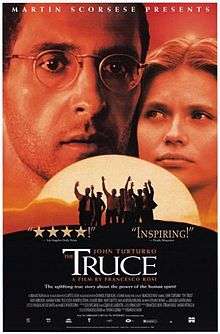The Truce (1997 film)
| La Tregua | |
|---|---|
 Promotional Poster | |
| Directed by | Francesco Rosi |
| Produced by | Véra Belmont, et al. |
| Written by |
Tonino Guerra Primo Levi, et al. |
| Starring |
John Turturro Rade Serbedzija |
| Music by | Luis Bacalov |
| Cinematography |
Pasqualino De Santis Marco Pontecorvo |
| Edited by |
Ruggero Mastroianni Bruno Sarandrea |
Release dates | April 24, 1998 |
Running time | 125 minutes |
| Country | Italy |
| Language | Italian, Russian, English, etc. |
| Box office | $71,448[1] |
The Truce (Italian: La Tregua) is a 1997 film directed by Francesco Rosi, written by Tonino Guerra, based on Primo Levi's memoir, The Truce. The film deals with Primo Levi's experiences returning to Italy in 1945 after the Red Army liberated the concentration camp at Auschwitz during the Second World War. This was Rosi's final film before his death in 2015.
Plot
Although liberated on January 27, 1945, Levi did not reach Turin until October 19 of that year. After spending some time in a Soviet camp for former concentration camp inmates, he embarked on an arduous journey home in the company of Italian former prisoners of war from the Italian Army in Russia. His long railway journey home to Turin took him on a circuitous route from Poland, through Russia, Romania, Hungary, Austria and Germany.
Cast
- John Turturro - Primo Levi
- Rade Šerbedžija - The Greek
- Massimo Ghini - Cesare
- Stefano Dionisi - Daniele
- Teco Celio - Col. Rovi
- Roberto Citran - Unverdorben
- Claudio Bisio - Ferrari
- Andy Luotto - D'Agata
- Agnieszka Wagner - Galina
- Lorenza Indovina - Flora
- Marina Gerasimenko - Maria Fyodorovna
- Igor Bezgin - Yegorov
- Aleksandr Ilyin - The Mongol
- Vyacheslav Olkhovskiy - Lt. Sergei
- Anatoli Vasilyev - Dr. Gotlieb
Awards
This film won the David for Best Director, Best Film and Best Producer at the David di Donatello Awards. It also won the Audience Award at the São Paulo International Film Festival.
It was nominated for the Palme d'Or at the 1997 Cannes Film Festival.[2]
Reception
Whereas the film can be seen as belonging to the tradition of the "cinema of prose," it also contributes to the "cinema of poetry," as defined by Pier Paolo Pasolini.[3]
Brian Webster, writing for the Apollo Guide, finds the film "a war story with little violence and virtually no sentimentality. If you're not ready for it, you might find The Truce passing before your eyes without making much of an impact. It doesn't smack you in the face with a powerful message, but instead works its way inside you more gradually."[4]
References
- ↑ http://www.the-numbers.com/movie/Truce-The#tab=summary
- ↑ "Festival de Cannes: The Truce". festival-cannes.com. Retrieved 2009-09-23.
- ↑ Erbaggio, Pierluigi (2007-11-18). "Francesco Rosi’s The Truce (1997)". Italian Film blog. Retrieved 2007-11-19. "In fulfilling his duty of messenger of a messenger, as said before, Rosi is very assertive and didactic. In the second half of the film, in fact, in a series of short scenes, many issues related to the Holocaust are treated and apparently exhausted in a very simplistic way. ... A scene that could be qualified as a moment of Pasolinian Cinema of Poetry is the scene in which the Italian survivors watch through a window the Russian family who gave them food to eat. Uncertain about their journey and about the fate of their own families, in this scene through the deforming glasses of a window this family appears like an unreachable mirage. The deformation and the color of these images tell us about the feelings and desires of these Italian men much more than they could explain with words by themselves."
- ↑ Bruce Webster, "Truce, The," Apollo Guide
External links
- La Tregua at the Internet Movie Database
| ||||||
| ||||||||||||||||||||||||||